Aug 18, 2025 – Leading Members’ Dharma Assembly, Interview at Baek Yong-seong Memorial Hall
Hello. Today is the day of the Leading Members’ Dharma Assembly, where Jungto Society’s leading members share the difficulties they face in their activities and establish a practice-oriented perspective.
After completing his morning practice and meditation, Sunim headed to the hospital at 8 AM for a regular health checkup. After finishing the examination, he returned to Seoul Jungto Center.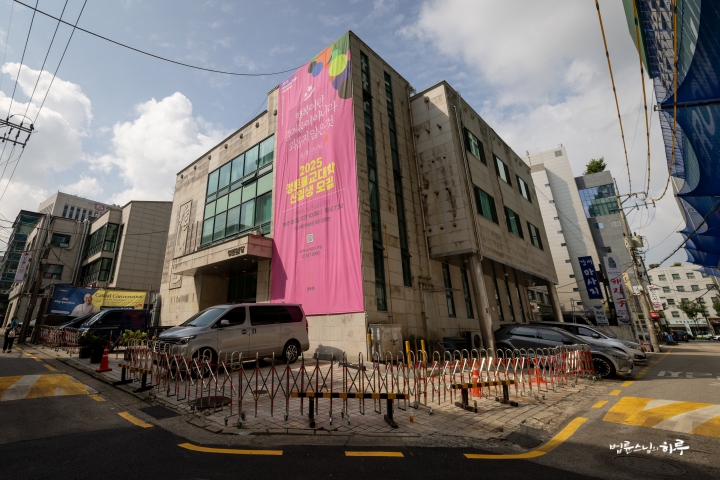
At 10 AM, the Leading Members’ Dharma Assembly began with a live broadcast from the Seoul Jungto Center broadcasting room. After the Three Refuges and Heart Sutra recitation, President Jeon Hae-jong of Jungto Society first presented the results of the national business regular meeting, followed by a welcoming ceremony for new leading members.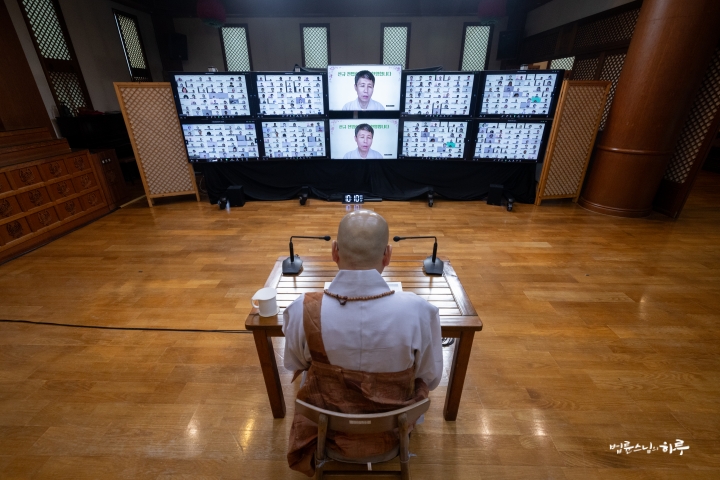
When a video introducing the 109 new leading members was shown, everyone applauded loudly to express their congratulations.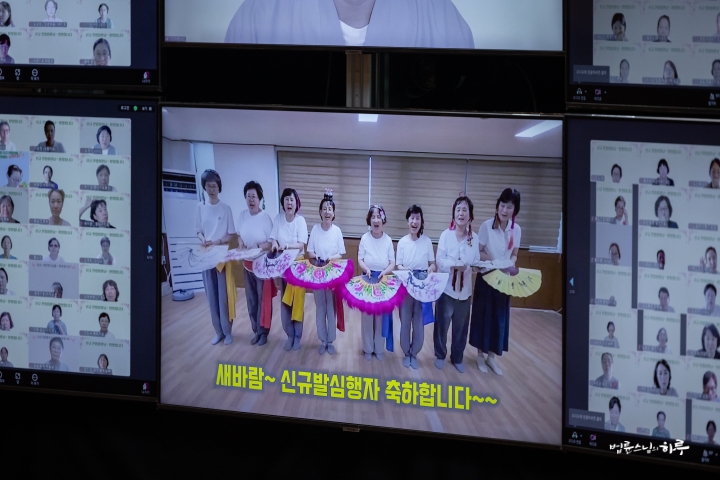
Next, representing the new leading members, Kim Mi-seung from the Suseong Branch of the Daegu-Gyeongbuk Division shared her reflections on the past year of training.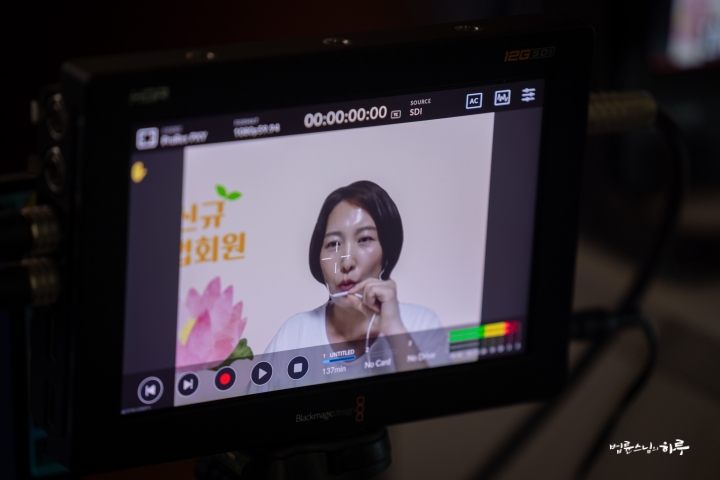
“In the spring of 2023, I was diagnosed with severe osteoporosis at an orthopedic clinic. Wondering why my body had become like this at such a young age, I thought deeply and ended up directing all my arrows of resentment at my husband. Wanting to eliminate my suffering, I enrolled in Jungto Dharma School. After attending the Awakening Retreat and realizing that everything originated from myself, my hatred toward my husband disappeared. When I tried to do three prostrations to my husband with a heart of repentance and gratitude, he said he would also do three prostrations to me, so we began doing three prostrations together every morning. Recently, when I was retested for osteoporosis, the results came back in the normal range. I believe my health has recovered because I start each day with prayer, grateful to my family and neighbors, and live according to the Buddha’s teachings. Just as I, who used to live struggling while following my desires, have become free and comfortable after encountering the Buddha’s Dharma, I hope my neighbors can also become happy. I think I now understand what fellow practitioners mean when they say that responsibilities are blessings.”
With all leading members joining the video conference, they requested a Dharma talk with three prostrations. Sunim welcomed the new leading members and shared news about the Youth Camp held over the past weekend. He also urged the leading members to show great interest in the upcoming Youth Festa scheduled for November.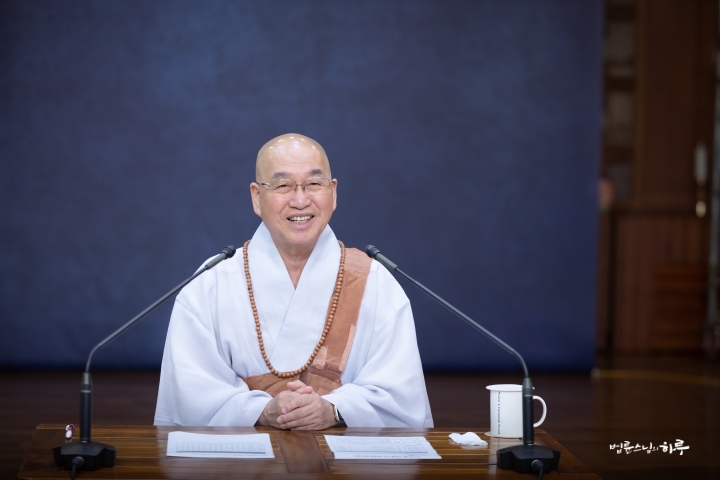
“Today, 107 Balsim Practitioners who have completed their propagation training and received the Three Refuges and Five Precepts, and who received their appointment letters at yesterday’s KMPU Assembly, have joined the Dharma assembly as full-fledged leading members. I sincerely welcome and congratulate you. I ask existing leading members to guide these new members so they can settle well into their roles as leading members. I also hope the new leading members will not lose sight of their original vows and continue to practice diligently.
Youth, Come Out into the World! A Festival of Hope and Courage – ‘Youth Festa’
The Special Youth Division is preparing a ‘Youth Festa’ event in early November, utilizing the entire Jungto Social and Cultural Center for a 3-day, 2-night program. This event aims to help young people have dreams, hope, and courage. For young people who are secluded in their rooms, it will be an opportunity to come out into the world; for those with emotional wounds, it will be a chance for healing; and for those interested only in personal problems, it will broaden their perspectives to society, nation, country, and the world. The purpose of holding the Youth Festa is to provide young people in frustration and despair with an opportunity to gain hope and courage.
Since renting an external venue from the start would be expensive and overwhelming to prepare, we plan to maximize the use of the Jungto Social and Cultural Center. Any young person can participate. We’re preparing various lectures, booths, and seminars in a format where participants can listen to, see, and participate in whatever they want. That’s why we’ve named the event ‘Youth Festa.’
Jungto Society has abundant human resources and content. We have ‘JTS’ conducting global relief activities, ‘The Peace Foundation’ working for peace on the Korean Peninsula, ‘Good Friends’ helping North Korean refugees, and ‘Eco Buddha’ conducting environmental practice movements, among various other activities. We also offer meditation, which many young people are very interested in these days. There are also training programs like the ‘Awakening Retreat’ and ‘Sharing Retreat’ held at Mungyeong Jungto Retreat Center. Few organizations domestically or internationally have as diverse content as Jungto Society. We can also utilize the space called ‘Jungto Social and Cultural Center.’ By mobilizing all of Jungto Society’s material assets and human resources, we aim to create an event with rich content while keeping costs low. 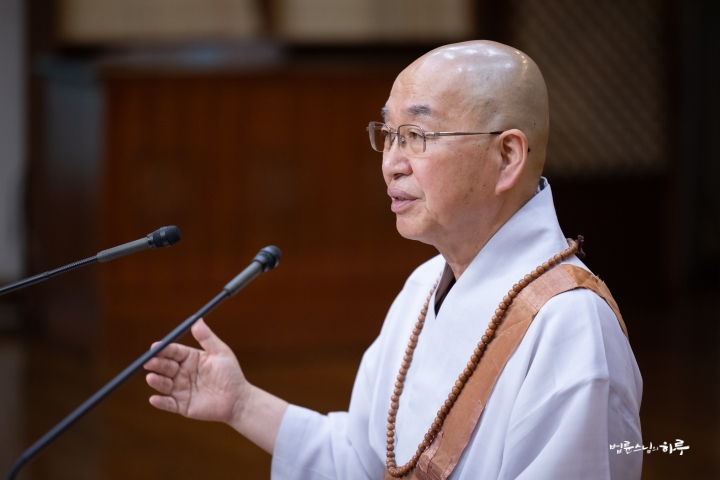
So yesterday I told the young people preparing for the event, ‘There is no failure!’ If youth participation is low, we can convert it to a Jungto Society event. If Jungto members each bring one young person and participate together, it could become an event with half youth and half Jungto members. That’s why I told them to proceed with confidence. If many young people come, it will be a great success, but even if not, there is no failure. No matter how few come, Jungto members can participate together. So I ask all leading members to support the youth both materially and spiritually so they can successfully hold this event.
The intense summer heat is starting to ease as we move into late summer. However, there may still be several more late heat waves. I hope all members take care of their health and continue to practice diligently while spreading the dharma.”
Next, Sunim received questions about difficulties experienced during activities. Three people pressed the hand-raising button and had conversations with Sunim. One of them asked for Sunim’s advice on what to do about feeling heavy and burdened whenever taking on responsibilities.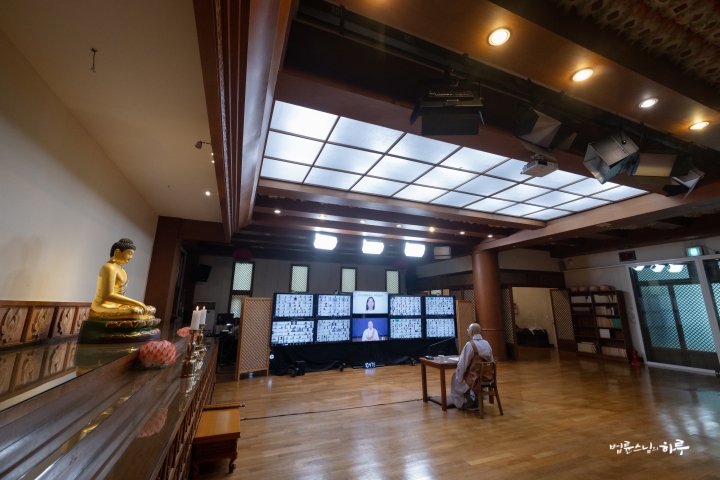
What Should I Do When I Take on Responsibilities and Only Feel Burdened?
“If you weren’t a leading member, that would be one thing, but you’re already a leading member, but you’re asking questions as if you’re not one – how can you do that? Aren’t you embarrassed? Still, you speak quite boldly. (laughter) 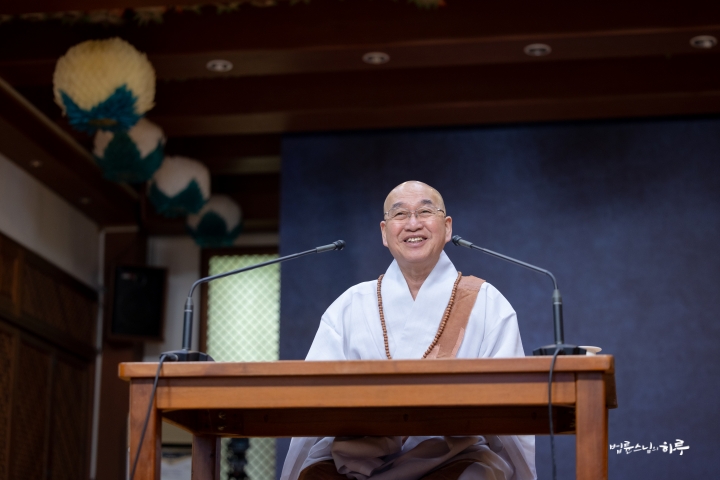
There are two ways people live. First, when placed in an environment, adapting to that environment. Second, changing the environment to suit oneself.
All life adapts to its environment. Since humans are also life and part of nature, we should adapt to our environment. When the water temperature in the East Sea rises, the pollock and squid that lived there move north. And fish like tuna that lived in warm southern waters follow. It’s the same with apple farming. In the past, apples grew well in Daegu, but as temperatures rose, the cultivation areas moved up to Mungyeong and Gangwon Province. In the future, they’ll move up to North Korea. This is adapting to the environment. All life is designed to adapt to its environment. That’s why when the climate changes, the ecosystem gradually changes too. Like that, it’s important for humans to adapt to their environment as well.
However, humans have developed cognition, so we not only adapt to our environment but can also artificially modify it to suit ourselves. Going to the beach or mountains when it’s hot is adapting to the environment. On the other hand, turning on a fan or installing air conditioning isn’t humans adapting to the environment, but changing the environment to suit ourselves. This is what we call civilization. That’s why human history is sometimes viewed as a history of civilization. But recently, as our power to change the environment has grown too large, it has resulted in environmental destruction and climate change, ultimately making our lives more difficult. As temperatures rise, water temperatures rise too; as water temperatures rise, evaporation increases; as evaporation increases, heavy rains intensify. The intensity of floods and typhoons has become stronger than before, causing greater damage. Until now, the levees humans built could sufficiently withstand floods, but as the amount and frequency of water increases, they can no longer hold, creating a vicious cycle.
Ultimately, adapting to the environment and changing the environment to suit oneself – these two must be well balanced. If you only adapt to whatever situation you’re in, while there are good aspects, you lose your agency. Conversely, if you try to change everything – whether people or environment – to suit yourself, there will be resistance and side effects.
When the questioner doesn’t do things if they’re difficult, doesn’t meet people if they don’t want to, doesn’t eat if it doesn’t taste good – this is like adapting to the environment. You’re adapting to your own karma and living according to your habits and temperament. That’s fine too. But in life, you can’t get by with just adapting to the environment. Living in caves then building houses, fetching water from rivers then installing water systems – these are changing the environment to live. Similarly, if you overcome your temperament and preferences to form relationships with people who think differently from you, your range of human relationships expands. To do that, you need to develop the mind to do things you don’t want to do. At first it’s unpleasant, but after repeating it several times, you adapt and it becomes manageable. You can’t eat certain foods because you keep avoiding them, but if you eat them several times, you adapt and they become edible. 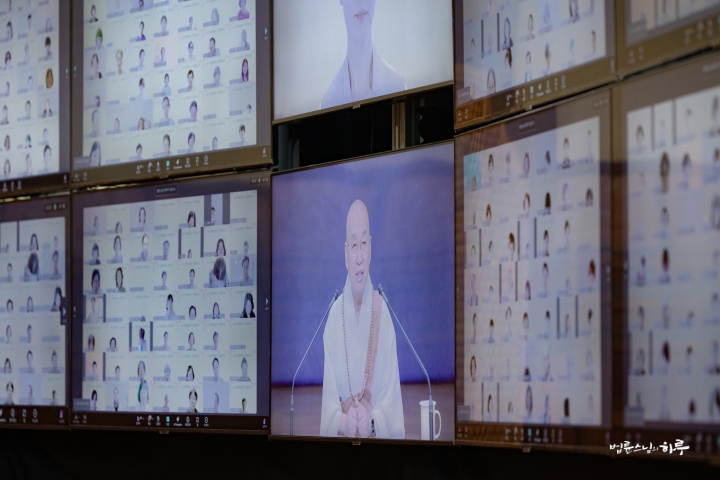
Most people don’t have experiences of overcoming challenges because they cling to their own temperament and preferences. As a result, the scope of their lives becomes narrower. Practice is about overcoming this. If you tend to be selfish, try shifting toward being more altruistic. Just as we change the natural environment, practice is about changing your own karma. There are two paths: you can choose not to do what you don’t want to do, or you can overcome your reluctance and do it anyway. 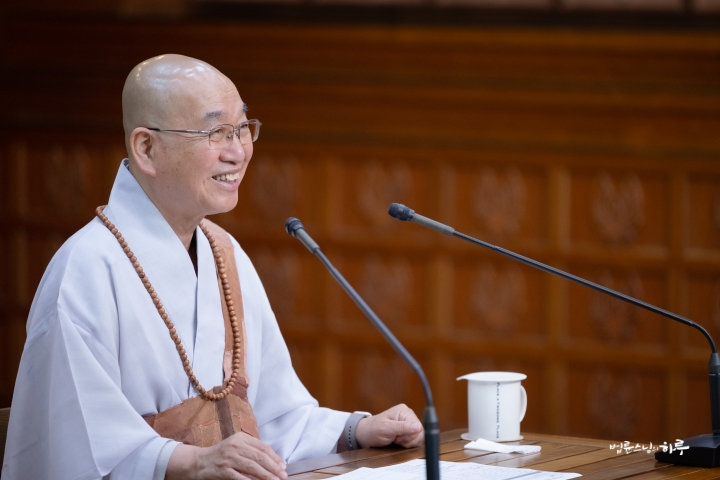
If you want to live according to your own temperament, you should resign from being a leading member. If you still want to maintain a connection with Jungto Society because you find it worthwhile, you don’t have to quit entirely – you can become a general member. A general member is someone who volunteers when they want to and doesn’t volunteer when they don’t want to. If you want to volunteer all day, you can do so, and if you don’t want to volunteer the next day, you don’t have to. You make your own decisions without any responsibilities or obligations. You give donations when you want to and pray when you want to. For membership fees, you can set up automatic transfers for a fixed amount, so you maintain your connection with Jungto Society.
If you want to do as you please, you can register as a general member. But if you want to challenge yourself a bit, you need to practice doing things even when you don’t feel like it. However, it’s difficult to practice alone. Even if you resolve to do morning practice, it’s not easy to do it by yourself. But if you make a promise with a fellow practitioner, you’ll get up even when you don’t want to because of that commitment. After doing this twice, three times, ten times, what was initially bothersome gradually becomes familiar and manageable.
Since you’ve already become a leading member, even if you don’t volunteer to take initiative, try accepting various responsibilities that come your way. Try them first, and if you find them too stressful and absolutely can’t continue, you can resign then. Once you actually start working with people, you might find it enjoyable. Many people say they initially didn’t want to volunteer because they were busy, but once they started, they found it fun and continued volunteering. So since you’ve already become a leading member, why not try being a group facilitator and taking on various responsibilities? If you really can’t do it because you’re physically unwell or it’s too difficult, you can quit then, can’t you? What do you think?” 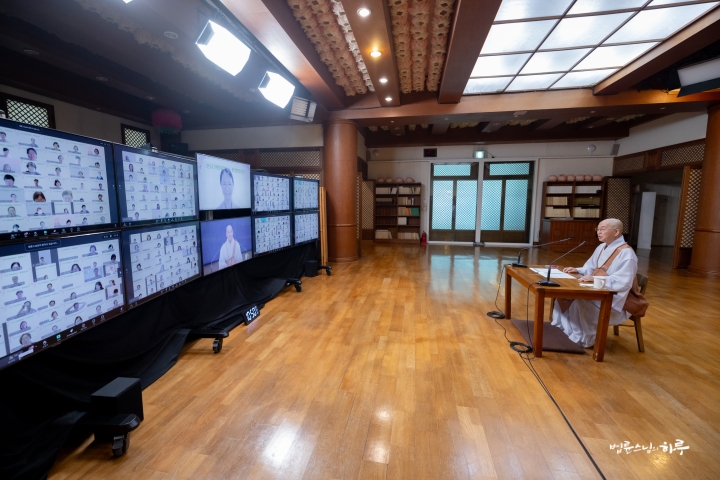
“My goal is to be active throughout the 30 years of the Second 10,000-Day Practice. So I won’t completely stop coming to Jungto Society, but I have a desire to take on lighter responsibilities with less accountability.”
“There’s no such thing as a light responsibility with less accountability. Having responsibility is what makes it a duty. Light work without responsibility is voluntary service done by general members. Even general members, when they take on responsible volunteer work, must fulfill that responsibility completely. Since you’ve already become a leading member, why not give it a try? If it really doesn’t work out, you can become a general member and do responsible volunteer work. If that’s still burdensome, you can do voluntary service. Most people climb up step by step from the bottom, but you’re starting from the top and working your way down if needed. Going down is easier than going up.
Since you’ve already become a leading member, I think it would be good to give it a try. If you keep thinking ‘I don’t like this,’ ‘It’s hard,’ ‘Why am I doing this?’ there’s no end to it. The most important thing is to let go and just do it. Doing this kind of work isn’t life-threatening, you won’t get in trouble for it, and it’s not like being deceived by a cult where you have to donate all your money to Jungto Society. If someone wants to donate their entire fortune to Jungto Society, we send them back. We only accept it after confirming that all family members have agreed. So for now, I think it would be good to try and see how far you can go.”
“Thank you.”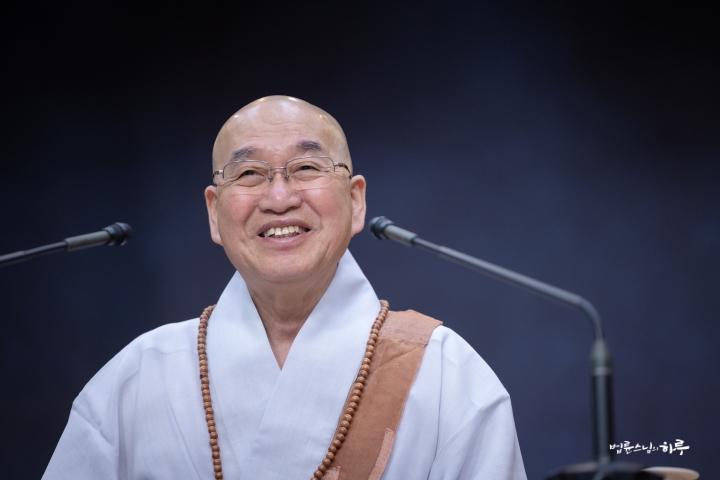
Questions continued one after another. By the time the dialogue ended, it was almost noon.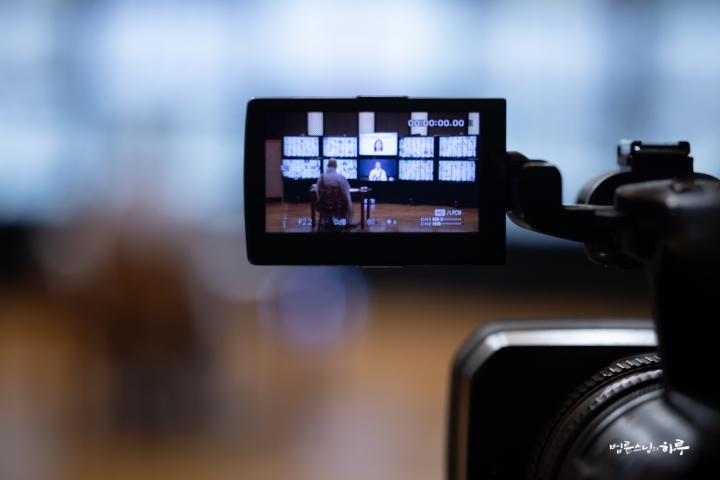
A guest had come to see Sunim, so he immediately left the broadcasting room and headed to the Jungto Social and Cultural Center. He had lunch with the guest while having a conversation. In the afternoon, another guest arrived, and he had back-to-back meetings.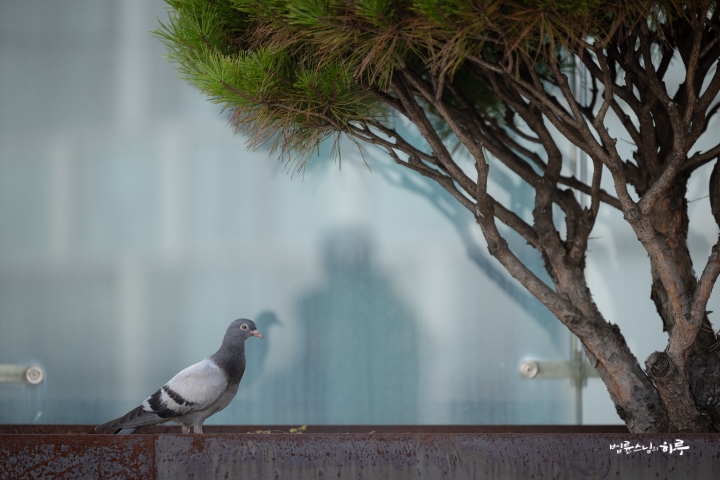
At 4 PM, representatives from the exhibition company for the Baek Yongseong Memorial Hall at Jangsu Jukrimjeongsa Temple came to visit Sunim. They came to prepare oral history materials to be displayed inside the memorial hall. After greeting Sunim, the company representatives set up their prepared cameras and lighting on the 15th floor rooftop Dharma hall. Once the filming preparations were complete, Sunim calmly took his seat and began sharing stories on various topics.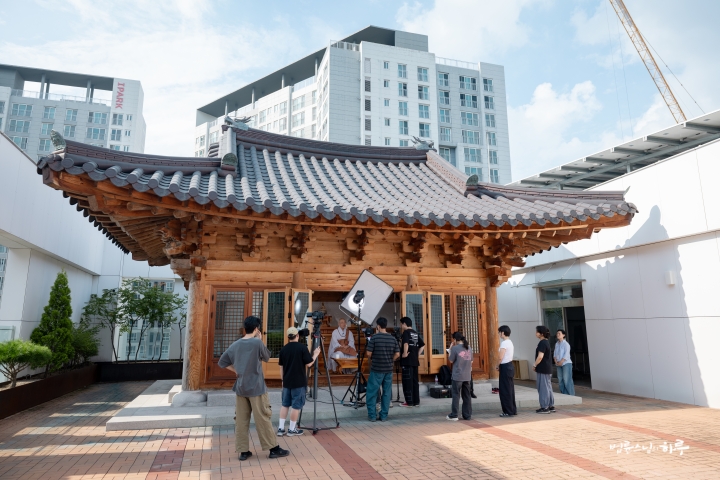
Sunim spoke in detail about many unknown episodes from Master Yongseong’s key independence movement activities, including his proposal to raise the Taegeukgi flag during the March 1st Movement, his guidance in transforming the Korean Empire restoration movement into the establishment of the Republic of Korea, his influence in adopting “Republic of Korea” as the country’s name, and his support for the Shanghai Provisional Government and dispatch of Yun Bong-gil to Shanghai.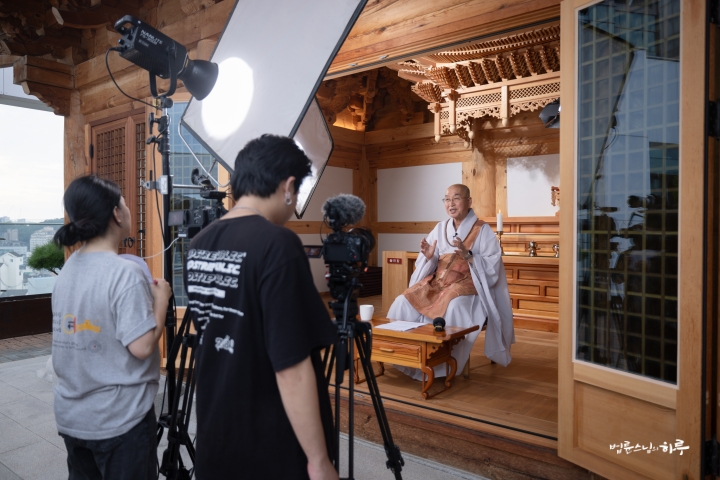
During the interview, the exhibition company representatives were curious about why Master Yongseong’s independence movement activities were not well known to the world. Sunim answered.
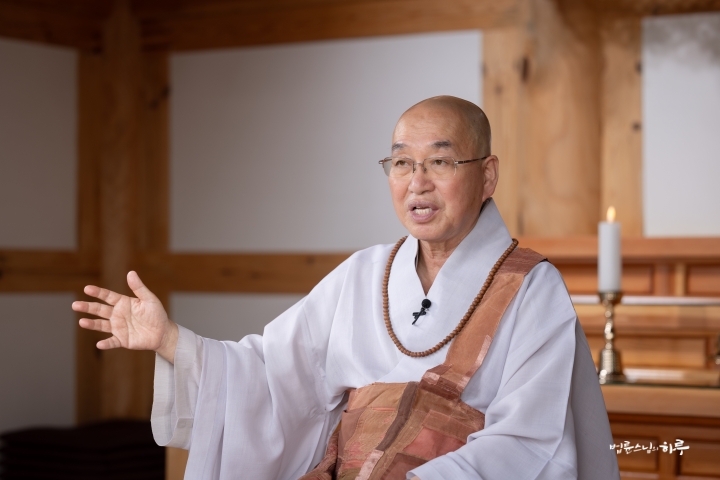
“First of all, independence movements were originally conducted in secret, weren’t they? Since evidence couldn’t be left behind, records were avoided as much as possible. Nevertheless, the evidence that did remain was either burned during Japanese house searches, or lost during the left-right conflicts in the post-liberation period and the Korean War. Also, Master Yongseong didn’t want to put his name forward and worked devotedly, so even those close to him didn’t know much about his independence movement activities.
Another reason lies in the situation of the Buddhist community during the Japanese colonial period. At that time, the majority of monks engaged in pro-Japanese activities. This was because, unlike the Joseon Dynasty which strongly suppressed Buddhism, the Japanese didn’t persecute Buddhism but rather protected it. Many monks built temples during the Japanese colonial period, studied in Japan, and Buddhism was expanding, so they maintained close relationships with the Government-General of Korea. After liberation, while the Buddhist community recognized Master Yongseong’s excellence as a practitioner, they couldn’t openly discuss his independence movement activities. This was because emphasizing that fact too much could lead to criticism asking ‘What were the other monks doing?’ As a result, the Buddhist community could hardly play an active role in discovering and publicizing Master Yongseong’s independence movement activities. Consequently, it was mainly through materials passed down in families, centered around Dongheon Wangyu and Bulsim Domun, who inherited Master Yongseong’s Dharma and attended to him, that his activities could be made known. 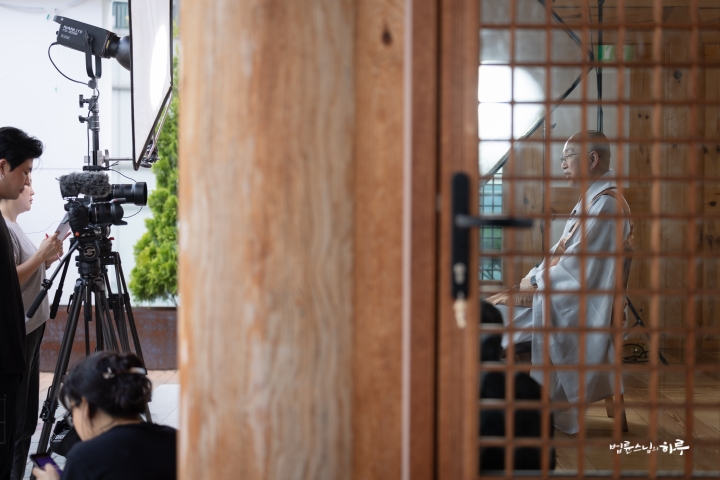
Why Manhae Is Remembered While Master Yongseong Is Forgotten
In contrast, Venerable Manhae Han Yong-un became widely known through poets and social activists. It wasn’t the Buddhist community that promoted him. Rather, the Buddhist community even rejected Han Yong-un because he had married. Nevertheless, Han Yong-un became widely known in society through social activists, while Master Yongseong never had the opportunity to be properly recognized by society. The actual roles that Master Yongseong played—signing the March 1st Declaration of Independence as a representative of the Buddhist community, providing substantial support not only to the Provisional Government in Shanghai but also to the armed independence movement in Manchuria—these many accomplishments have not been well known to the world until now.”
After an hour-long interview, the interviewer asked for final words of advice for the people who will live in the future. Sunim specifically explained what it means for us to inherit Master Yongseong’s will.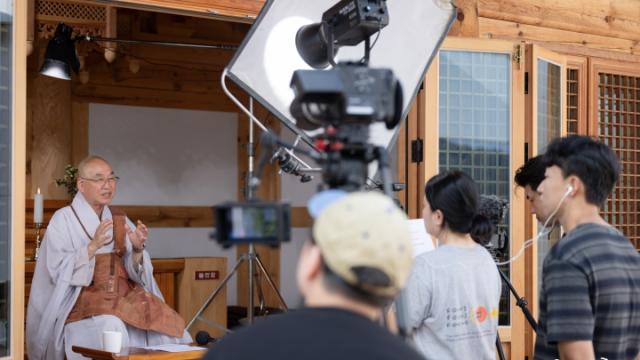
“The era in which Master Yongseong lived was a dark period of chaos. When he was born, the Joseon Dynasty was collapsing with popular uprisings occurring throughout the country. In his youth, foreign powers invaded and the Donghak Revolution broke out. In the latter half of his life, the country was lost to Japan, and he resisted the brutal oppression of Japanese imperialism until he passed away without seeing liberation. Even in such dark times, he never lost hope and consistently worked for the independence of the nation, which was the task of the era, and as a monk, he devoted himself to establishing the correct Dharma of Buddhism. If we inherit this spirit today, what would be our tasks of this era? 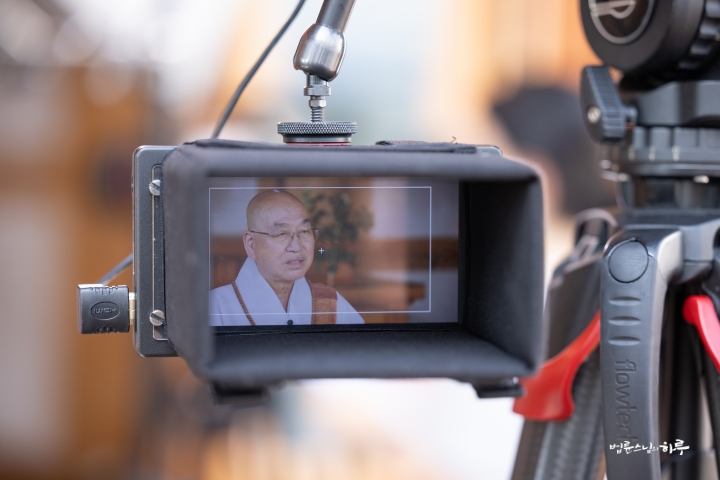
Master Yongseong’s Will Leading to Peace, Unification, and Healing Humanity’s Hearts
First, it is peace on the Korean Peninsula. The democracy, economic growth, and Korean Wave that we have cultivated over the past decades would all disappear overnight if war breaks out. Therefore, it is most important to maintain peace so that war never occurs. True liberation does not stop at recovering our lost nation but includes building a democratic country where the people are the masters and unifying our country that was divided by foreign powers. Therefore, achieving peace, unification, and a democratic society is the way to inherit Master Yongseong’s legacy in our time.
Second, not only Korean people but people all over the world are experiencing mental confusion. In the past, hunger and disease were the causes of suffering, but now many people suffer from stress even amid abundance. The path to healing wounded hearts lies in the Buddha’s Dharma, which helps people realize their own ignorance and become free from suffering. This can be said to be the best medicine for all humanity, transcending any particular religion. Therefore, it is important to spread the Buddha’s correct Dharma throughout the world. Enabling people of other religions and those without religion to learn this Dharma and attain peace of mind by transcending religious forms and boundaries—that is, the activity of sharing this wonderful Dharma with humanity—is the way to inherit Master Yongseong’s legacy.” 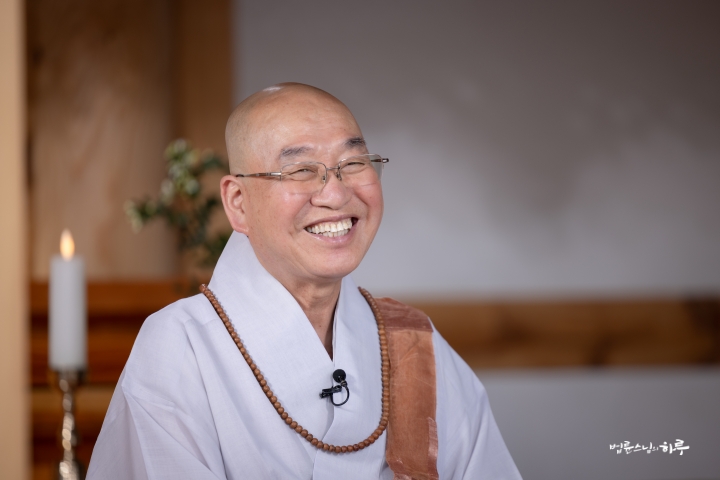
After encouraging the exhibition company staff who had worked hard on the filming, Sunim concluded the interview.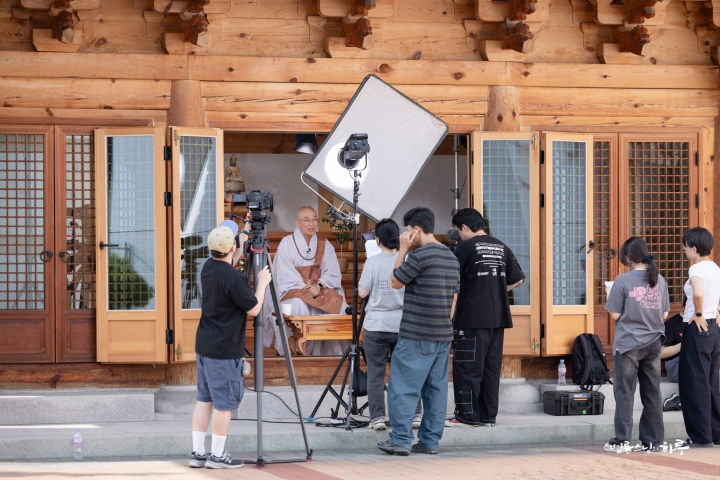
As the sun set, at 7:30 PM, the evening session of the Leading Members’ Dharma Assembly began with leading members joining the video conference.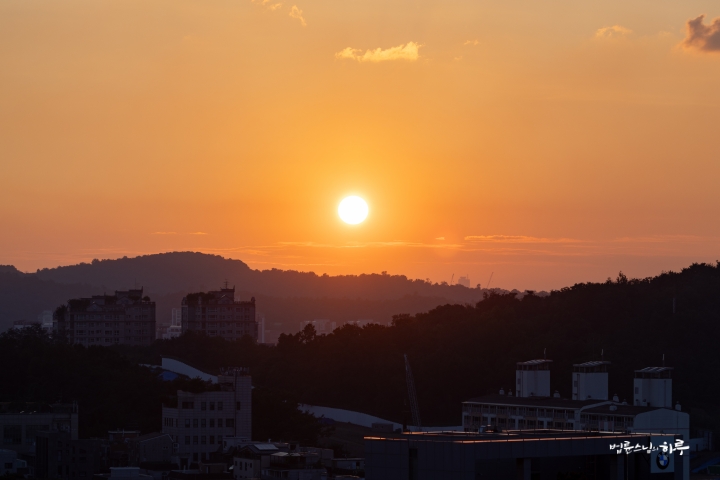
Like the morning assembly, new leading members were introduced and welcomed. When the video introducing the new leading members was shown, everyone applauded enthusiastically to express their congratulations.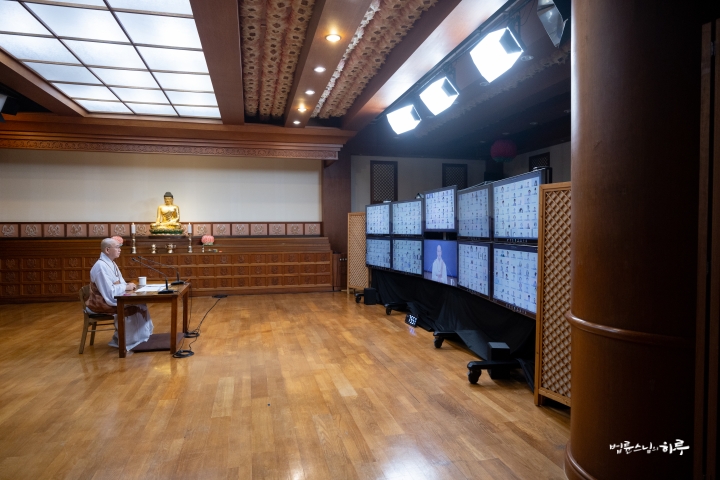
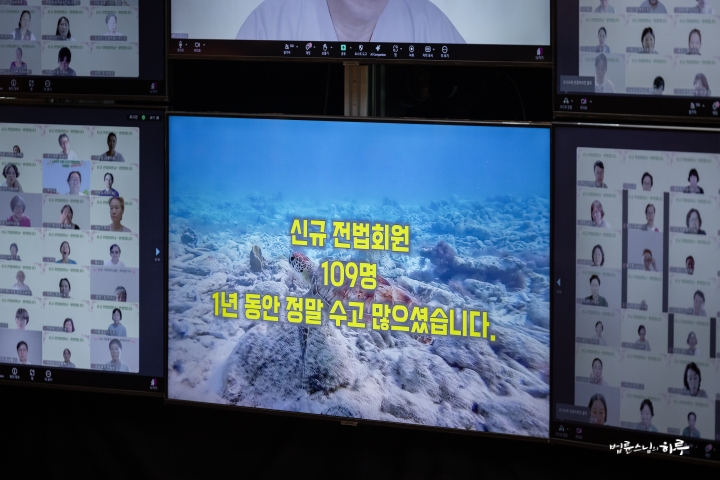
Next, representing the new leading members, Han Bong-hwa from the East Gwangju Chapter of the Gwangju-Jeolla Division shared her reflections from the past year of training.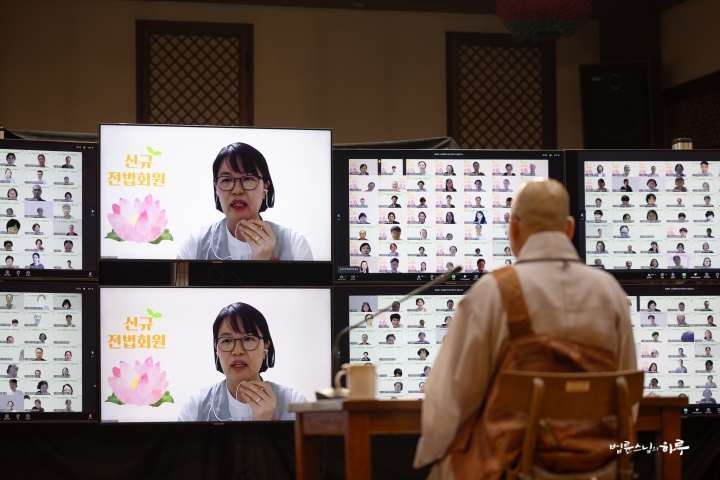
Listening to the story of overcoming various difficulties, everyone hoped and cheered for her to continue with today’s initial aspiration.
Next, everyone requested a Dharma talk from Sunim with three prostrations. Sunim welcomed the new leading members and briefly introduced Jungto Society’s schedule for the second half of the year before beginning the Dharma Q&A.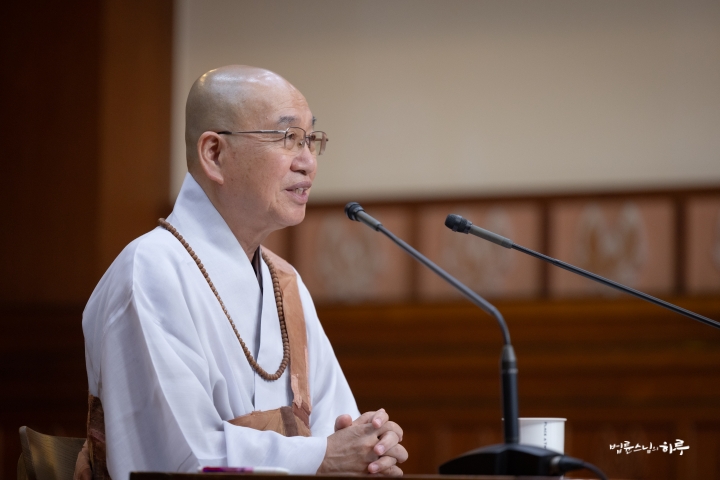
For one hour, five people pressed the hand-raising button and had conversations with Sunim. One of them sought Sunim’s advice on how to actively fulfill their role without being attached to results.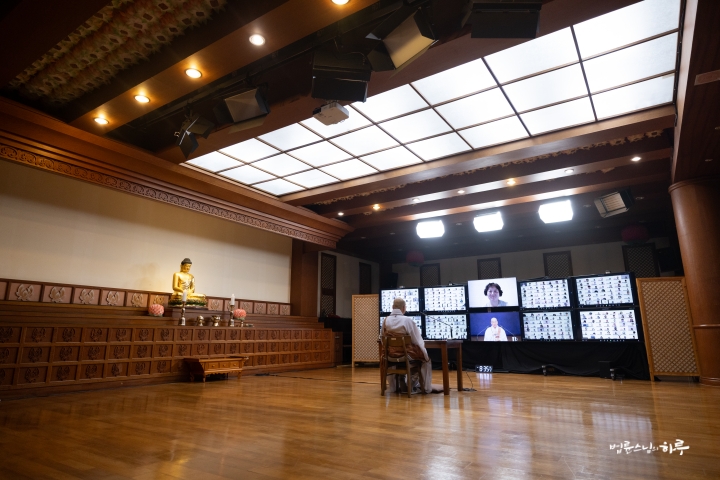
How Can I Fulfill My Responsibilities Without Being Attached to Results?
“Don’t you know your own mind best? Most people believe they’re acting out of responsibility when they encourage others, only to realize later that they were actually driven by attachment to results. The opposite case—thinking you’re acting out of attachment but discovering it was actually responsibility—is very rare. In other words, you might have the realization ‘I thought I was good, but I’m not,’ but rarely ‘I thought I was bad, but I’m actually quite good.’ If you’re confused about whether it’s responsibility or attachment to results, you don’t need to ask me. Just recognize, ‘I’m too attached to results.’
So when might someone not realize something themselves but come to understand their attachment after asking Sunim? It’s when someone says, ‘I fulfilled my duties solely for their benefit without any attachment,’ and Sunim points out, ‘Actually, there’s an attachment to achieving results underlying your mind,’ leading to their awakening. But right now, you already know you have a lot of attachment without needing me to tell you. Are you perhaps hoping I’ll say, ‘No, that’s not attachment, it’s responsibility’?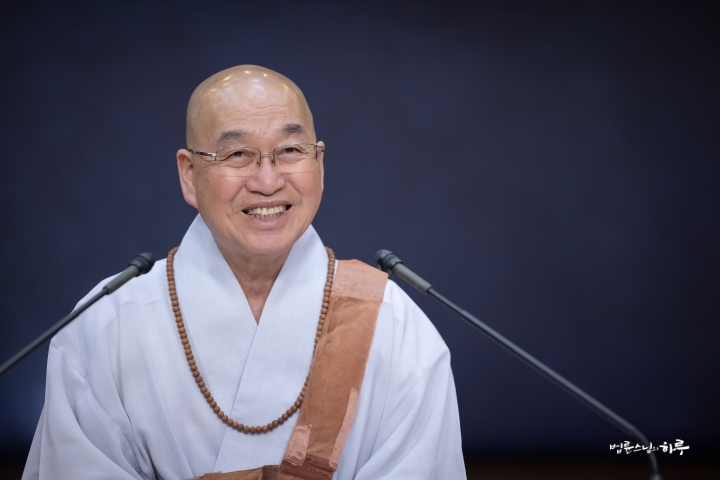
For example, let’s say people requested to visit Bulguksa Temple in Gyeongju. Even if it’s a bit inconvenient for you, if you made the effort for them by booking a bus, arranging accommodations, finding a guide, and gathering 40 people, this wasn’t done out of attachment but because you did what was necessary for those who requested it. However, if only 20 people actually sign up, or if 40 people initially registered but many canceled midway leaving only 25, you end up calling people around you to encourage them to join the Gyeongju trip to fill the remaining spots. The former was done “for them,” but the latter is done “to fill the seats.” This is human psychology. It’s not because people are bad; this often happens when we work on things. I’m not saying don’t do such work, but rather to be mindful when this happens. If the former case is “aspiration (願),” the latter can be called “attachment (執着).”
Making phone calls to encourage people to enroll in the Dharma School is itself “work for them.” However, if you feel upset when someone you invited doesn’t participate, that’s your “attachment.” While you say in words that you’re doing it for them, in reality, you’re attached to “how many people I recruited,” which is why you feel upset and annoyed when someone doesn’t sign up. This kind of attachment needs to be let go.
It’s not easy to distinguish whether something is “aspiration” or “attachment” by itself. Often, we don’t even know our own minds well, right? But if you feel bad when things don’t go well, that’s “attachment.” Conversely, if it comes from “aspiration,” you won’t feel disappointed or unpleasant even when things don’t work out. If it doesn’t work, you can simply try a different approach. If you recommended it for their sake, whether they sign up or not is their freedom. If that person is just going about their business and you feel bad despite having offered your help for them, that’s your attachment.
The same applies when we do street fundraising. If you’re doing it simply with the intention of helping children, you won’t feel upset even if passersby don’t donate money. Whether they give or not is their freedom. You just do your best. However, human psychology is such that we feel good when a lot of money comes in and feel disappointed when little comes in. The point is to observe the mind that arises at such times. You can notice, “Ah, I’m attached to this,” become aware of it, and turn it around. 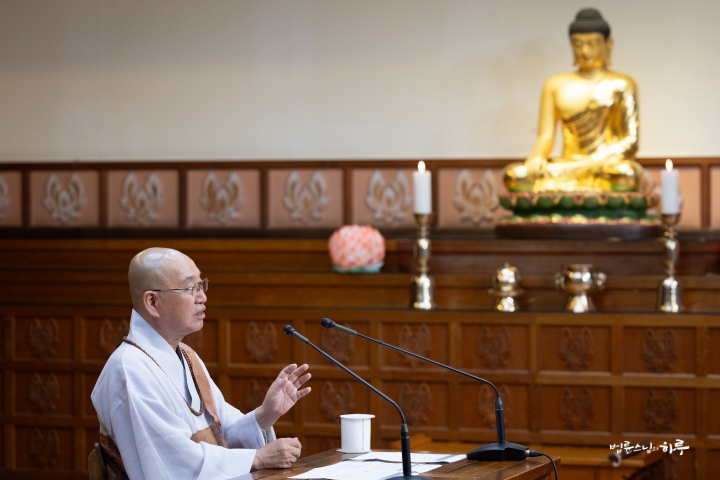
If you don’t do anything at all to avoid attachment, that’s an attitude lacking both aspiration and responsibility. You should send emails, make phone calls, and do your best actively, but understand that whether they participate or not is their freedom. If you think ‘I must get this person to enroll,’ you’ll be afraid to even make the call. You’ll be scared of being rejected or criticized. But if you do it with a heart for their benefit, it’s okay even if you get cursed at. If you suggest, ‘Would you like to try the Dharma School?’ and they respond, ‘No, don’t call me about this again!’ you can simply say, ‘Okay. I called because I thought it would be good for you. Sorry if it upset you,’ and move on. You shouldn’t argue with them saying, ‘How can you be like that?’
When you’re attached to results, it becomes even harder to promote or make calls. The same goes for counseling. Because you think you must provide answers, you’re afraid someone might ask something you don’t know. Just listen with the mindset of simply listening, thinking ‘Oh, they’re asking this question.’ If you don’t know, just say ‘I’m not sure about that.’ This way, counseling becomes much easier.
If you actively promote and the other person says ‘That’s offensive’ or ‘You’re being too pushy,’ just say ‘Sorry’ and step back, then try again later. The reason thoughts like ‘Am I too attached to results?’ keep arising might be because you don’t want to do the work. People with a clear sense of purpose don’t tend to hesitate like this.”
“Thank you. I understand well.”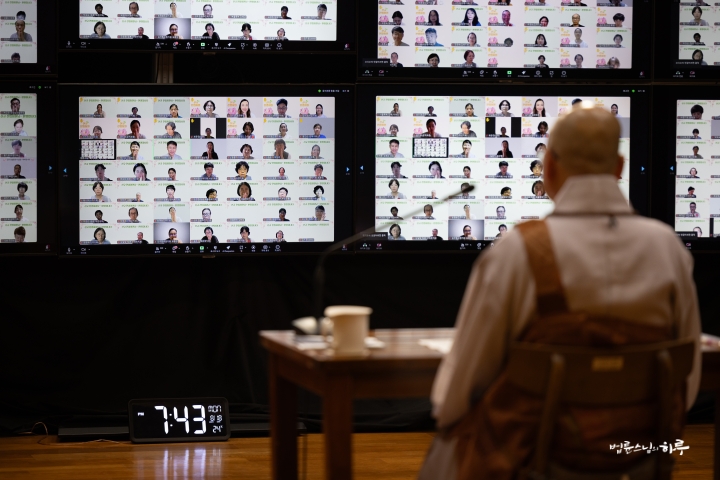
Questions continued to follow.
When the Sutra Course content gets to about the middle, it seems to change to Buddhist history classes, and students find it a bit boring. It would be good if it could include content about mind practice as well.
As Jungto Society’s offline activities and SNS activities increase, related inquiries come to the call center. However, there’s difficulty in responding because there’s no information or advance sharing about related events or work.
Among Dharma School students, some are leaving because they feel the main temple practice activities are too religious. How should we guide them?
When meditating, my breathing is rough, so I intentionally tried to make it comfortable. Is that okay? Don’t we need a plan to recruit Dharma School students through K-meditation?
After finishing the conversation, it was well past 9 PM. The live broadcast ended with the promise of next month’s leading members’ Dharma assembly.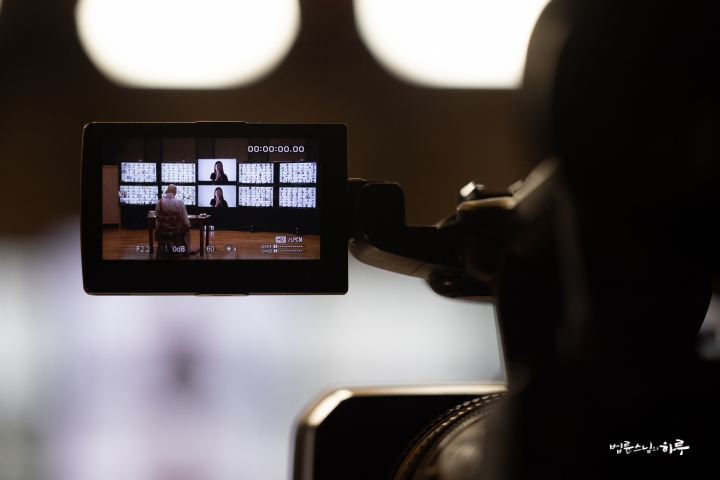
Tomorrow, at the request of Father Kim Hong-jin, Sunim will attend an advisory committee meeting of ‘Dungji,’ an NGO that supports overseas adoptees, and will have consecutive meetings with guests visiting the Peace Foundation.





